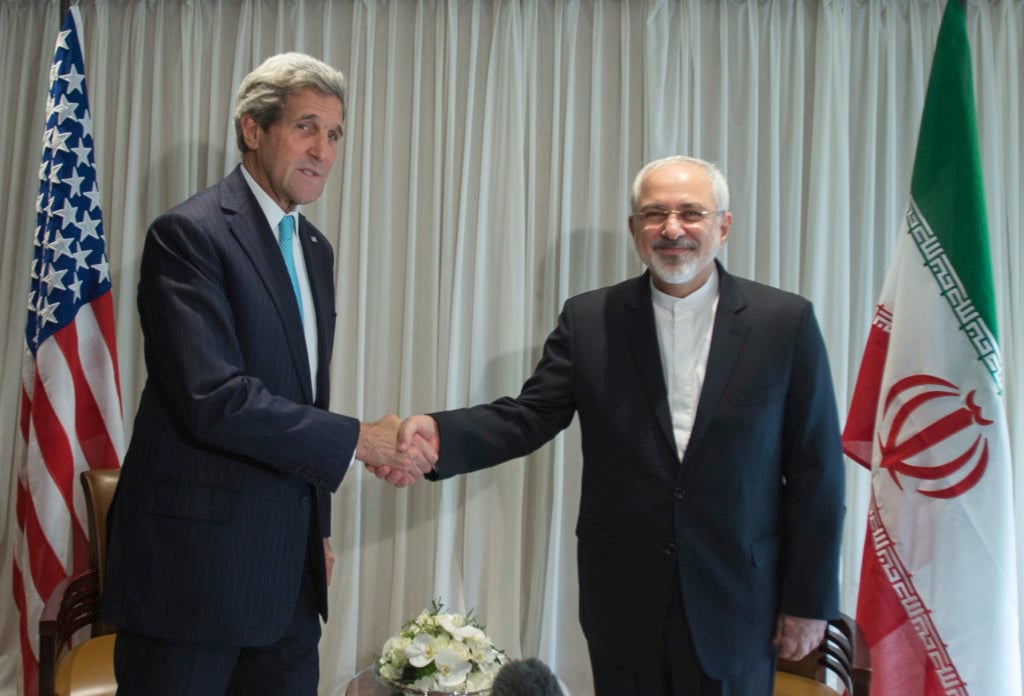
Secretary of State John Kerry meets with Iranian Foreign Minister Javad Zarif in Geneva on January 14 for a bilateral meeting to provide guidance to their negotiating teams before their next round of discussions, which begin on January 15.
U.S. Mission/Eric Bridiers
Withdrawing from the Iran deal puts the United States in a weaker position in every way.
Following the 2016 election, some wondered if President Trump was some sort of strategic savant, playing a game of three-dimensional chess behind a façade of emotionally volatile ignorance. Trump quickly put this theory to bed, though, and his decision to withdraw from the Joint Comprehensive Plan of Action (JCPoA) demonstrates that far from anticipating eight moves ahead, the White House is not even planning one move ahead.
The JCPoA required Iran to submit to constant monitoring of its nuclear sites and strict limits on its uranium enrichment (both in terms of quantity and degree of enrichment), and—despite the lie that President Trump keeps repeating—the agreement bars them from ever developing a nuclear weapon. If Iran had violated the agreement, international sanctions would have snapped back into place, crippling the Iranian economy and returning it to global pariah status.
By instead violating the agreement himself, President Trump has left Iran with two options, both of which are pretty great for Iran and terrible for the United States. The first is that the other signatories and Iranians decide they can continue the deal without the United States (a possibility already in the works). If the agreement does, in fact, hold, Iran’s economy will not suffer greatly because unilateral sanctions, even from the United States, are nearly useless. Ultimately, the United States will have given up its leadership position in the world, and its standing to accuse Iran of misbehavior if they actually do violate the agreement in the future. Meanwhile, Iran’s ally, Russia, will have yet again achieved its chief goal: a widening gulf between the United States and Europe.
But Tehran could instead opt for a path of confrontation. They could reasonably declare that American withdrawal from the agreement frees them from their own obligations under it. This would allow them to resume their nuclear program, giving the United States two options: allow them to enrich uranium and achieve a short breakout time or a nuclear device, or go to war.
Some have claimed that Iran’s nuclear program could be destroyed with air strikes alone, but the facts do not support this. Even if the nuclear program could be destroyed by strikes, it will still be up to Iran whether the United States is then forced to commit ground troops. After all, Iran could retaliate by attacking the American 5th Fleet, Israel, or American civilians around the world, which would, in turn, necessitate an American response; air strikes in such a situation would be insufficient.
A critical element of effective strategy is expanding the set of possible actions while reducing the choices available to the enemy. Instead, President Trump has done the exact opposite, giving President Rouhani all of the choices. The other week, if Rouhani had restarted the Iranian nuclear program, he would have faced strong sanctions and international scorn; if he restarts it tomorrow, he will face relatively little of either.
Hardliners in the United States and Iran have always opposed the agreement, arguing that the other side cannot be trusted. The White House yesterday caved to the American hardliners, proving the Iranian hardliners right. Rouhani will face increased pressure from those hardliners to abandon the agreement himself and to resume the nuclear program. In the face of that pressure, let us hope that President Rouhani demonstrates more intelligence, integrity, and courage than President Trump.
Nathan M. Kohlenberg is a Security Fellow with Truman National Security Project and a graduate of the Johns Hopkins School of Advanced International Studies. He was born and raised in Providence. Views expressed are his own.